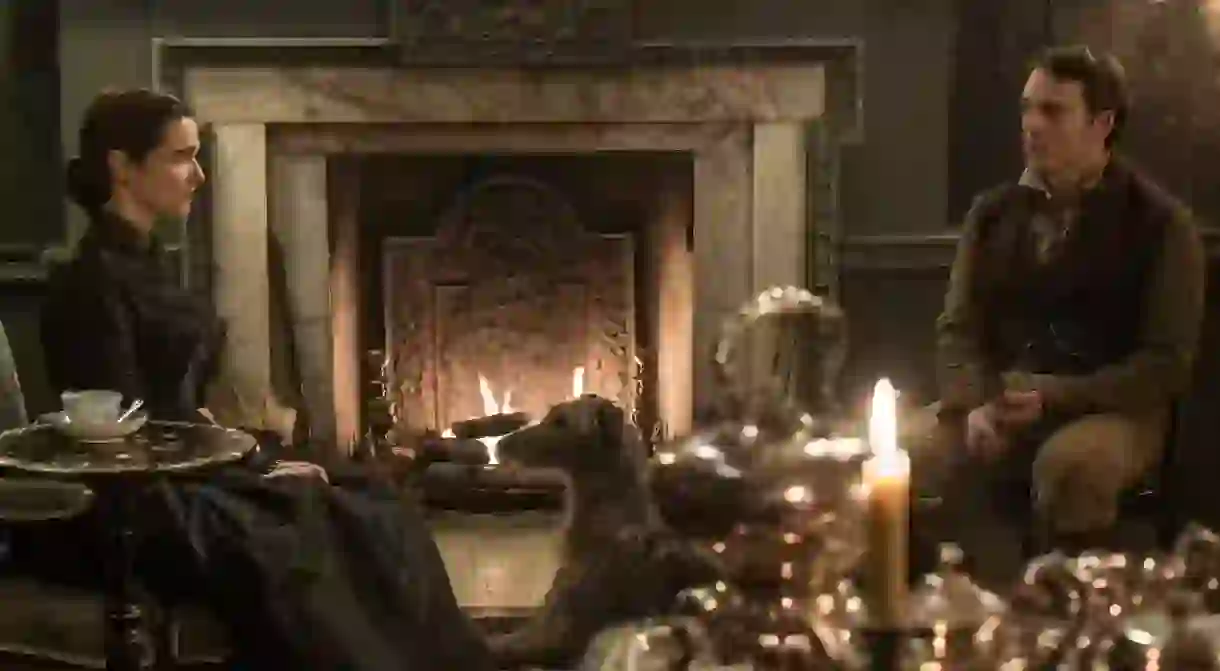Did She? Didn't She? The Brilliant Uncertainty Of "My Cousin Rachel"

With the release of My Cousin Rachel last week, we caught up with director Roger Michell and Daphne du Maurier expert Tatiana de Rosnay to talk about what makes the story so unique: its sinister ambiguity.
A few minutes with Daphne du Maurier’s most passionate biographer, Franco-British writer and journalist Tatiana de Rosnay, were enough for me to discover that my original reaction to My Cousin Rachel may have been slightly off. (A humbling experience quite a few British journalists were made familiar with over the past few days, but I digress.) If the work focuses on the relationship between 24-year-old Philip and Rachel (widow of his beloved older cousin and guardian, Ambrose), it is darkened by a central mystery: did Rachel kill her husband, or didn’t she?
Though this enigma lies at the heart of the story, it seemed to me a secondary concern. One in fact used with considerable skill by writer/director Roger Michell to tackle a much more far-reaching subject, in the form of a violently unjust and oppressive male perception of women. In other words, I saw My Cousin Rachel as being about a spoiled, vicious boy who convinces himself Rachel is evil because she was the focus of his adored cousin’s affections, and rejected his love. A reading I’ve since found out that not only sounds reductive, but probably is as well.
A confused boy and a mysterious woman

De Rosnay enlightened me on what she saw as the novel’s genesis, which had been clearly influenced by Daphne du Maurier’s turbulent life at the time of writing, in 1950–1951. “She had a major secret crush on a woman called Ellen Doubleday, who happened to be her American publisher’s wife. Of course nobody knew anything about this—Daphne du Maurier was a very secretive woman—but she was madly in love. And so she did what many writers do when they want to tell a secret without telling: she invented a story in which she herself, Daphne, is this young man Philip who falls head over heels for an older woman who looks exactly like Ellen Doubleday. She wanted to build a story around jealousy.”
Admittedly this called into question my singularly negative view of Philip, and de Rosnay indeed possessed more sympathy for the character. “He comes out,” she went on, “looking like someone who’s completely lost—in the sense that he’s besotted with this woman, crazy about her, and loses it all. And that’s I think what du Maurier wanted to show: she knew nothing could ever happen with Ellen Doubleday, and so she built this impossible love story around this older, seductive, mysterious woman. And you never know whether this woman is a demon, or whether this woman is an angel. And I think that Daphne du Maurier wanted us to keep guessing until the very end.”
An ambiguous conclusion Roger Michell revealed he very much shared: “I don’t know whether she’s guilty or not—du Maurier didn’t either—and I’d want people to argue the toss over it at the pub, café, or wherever after seeing the film.”
Our views on Philip, however, were much closer, which may explain why Sam Claflin’s version of the character is slightly more brash, and physical, than he appears in the novel. “He is not an innocent bystander, certainly,” he agreed, “Philip represents that whole class who believe only in property, and live by it. […] It was a tricky role, in which Sam had to play both the handsome, naive, gawky British boy, as well as one unable to get over his intentions. He pulled it off well.”

The feminist thread
We did nonetheless all come together on the idea that du Maurier’s My Cousin Rachel has a strong feminist thread running through it, in that Rachel is constantly doubted, and suspected, for what could essentially just be her looking after herself. It is an aspect of the book that was emphasized in the movie. “I felt it among the bones of the novel,” Michell said. “Du Maurier was an independent soul, who was in love with another woman, and who wrote it before the great revolution of the 1960s.”
“And it [feminism] is an anachronism, but it was played up consciously. The original did, in effect, parachute a modern woman into Jane Austen times, and had other odd anachronisms of its own… Christmas trees didn’t exist until the end of the 19th century, and I don’t believe agrarian communities were really as nice as she presents them, probably much more unpleasant.”
For de Rosnay as well, Rachel is a reflection of du Maurier’s independence, much like the novelist’s other great female character Rebecca de Winter (from the aptly-named Rebecca). Yet she is made to suffer for it: “Rachel is not perhaps as beautiful, as dazzling as Rebecca, but she certainly knows how to make a man lose his head—because they all do, obviously. And somehow she’s punished for that, which is strange in a way… She wants to lead her own life, she doesn’t want to belong to anyone.”

Did she? Didn’t she?
Which quite conveniently brings us back to my original point: that Rachel is the innocent party. If indeed du Maurier wanted to exorcise her love and jealousy, as de Rosnay maintains, then the writing of a character that is hurt, repeatedly, by the love and jealousy of others would make perfect sense. Particularly when the main culprit, naive and half-crazed by passion as he is, happens to be the narrator. A fairly cathartic work, then, wouldn’t you say?













